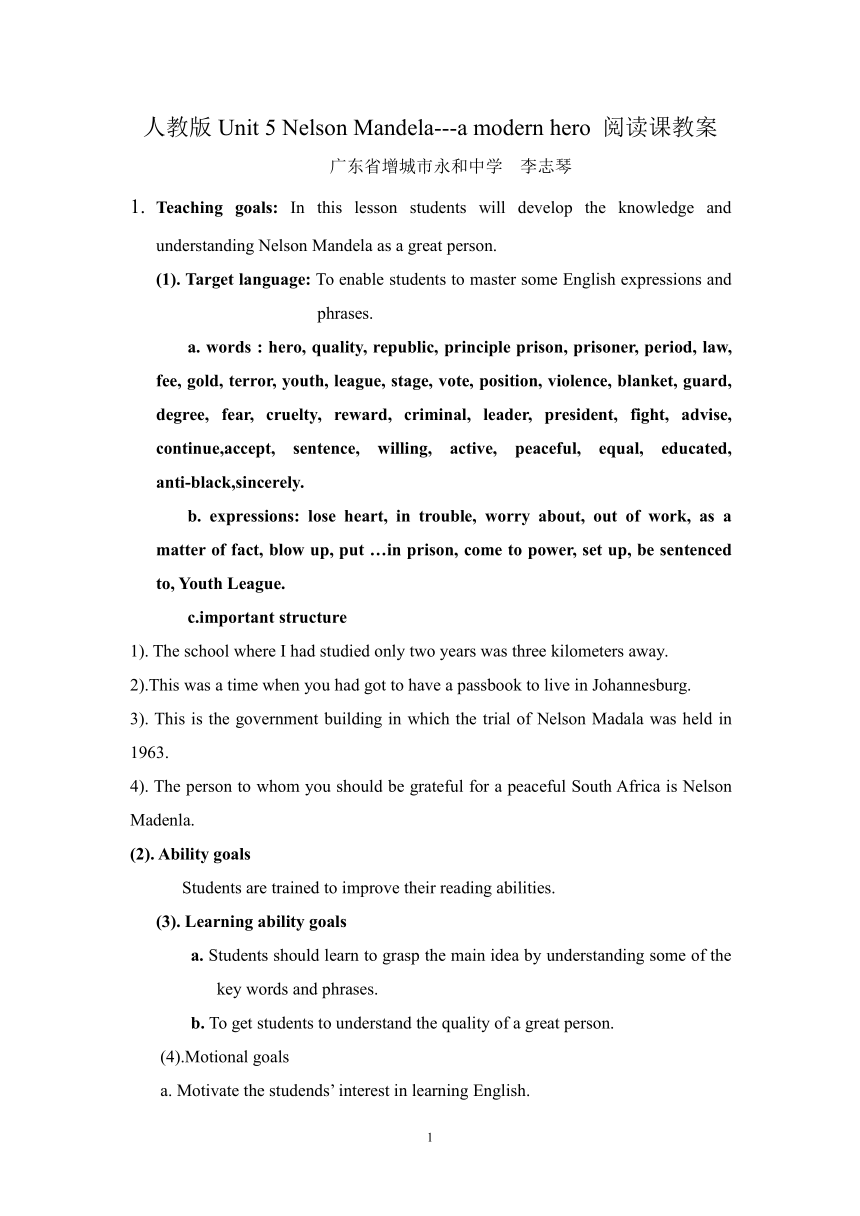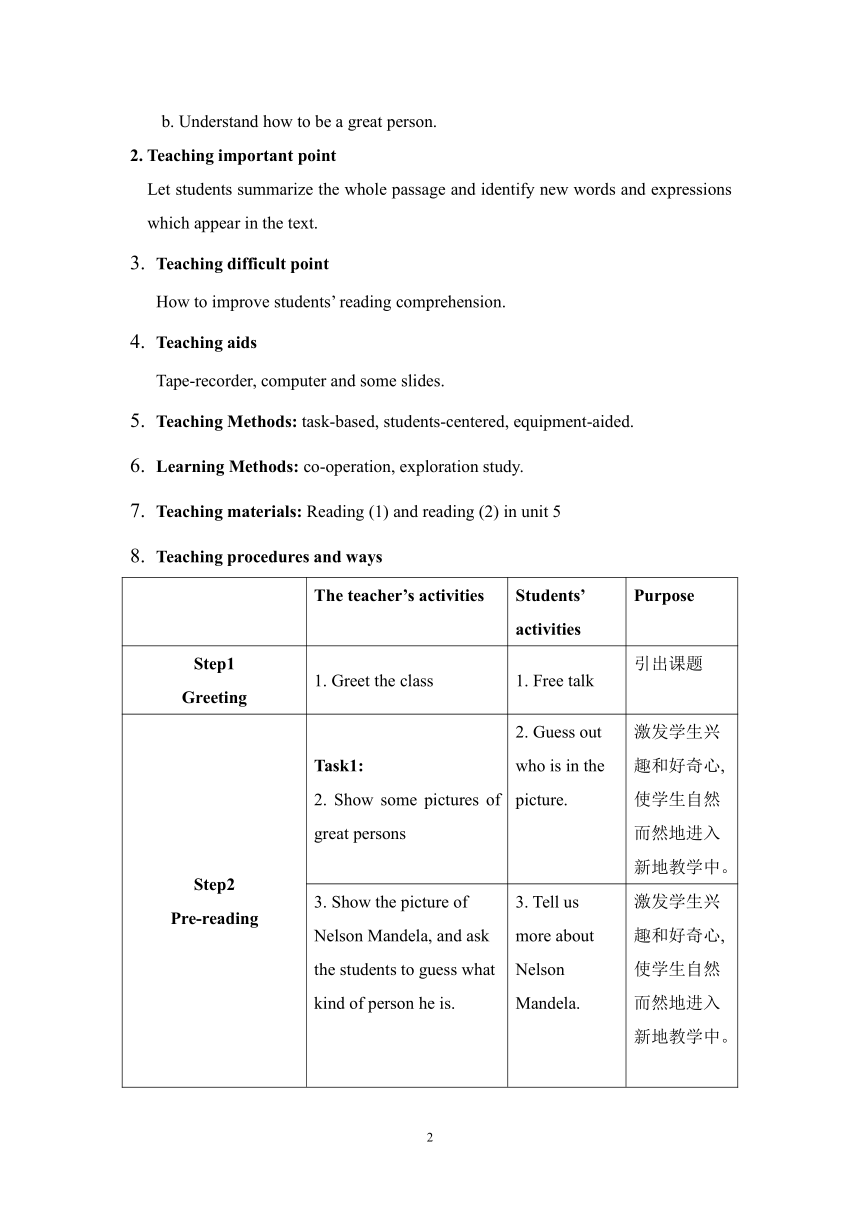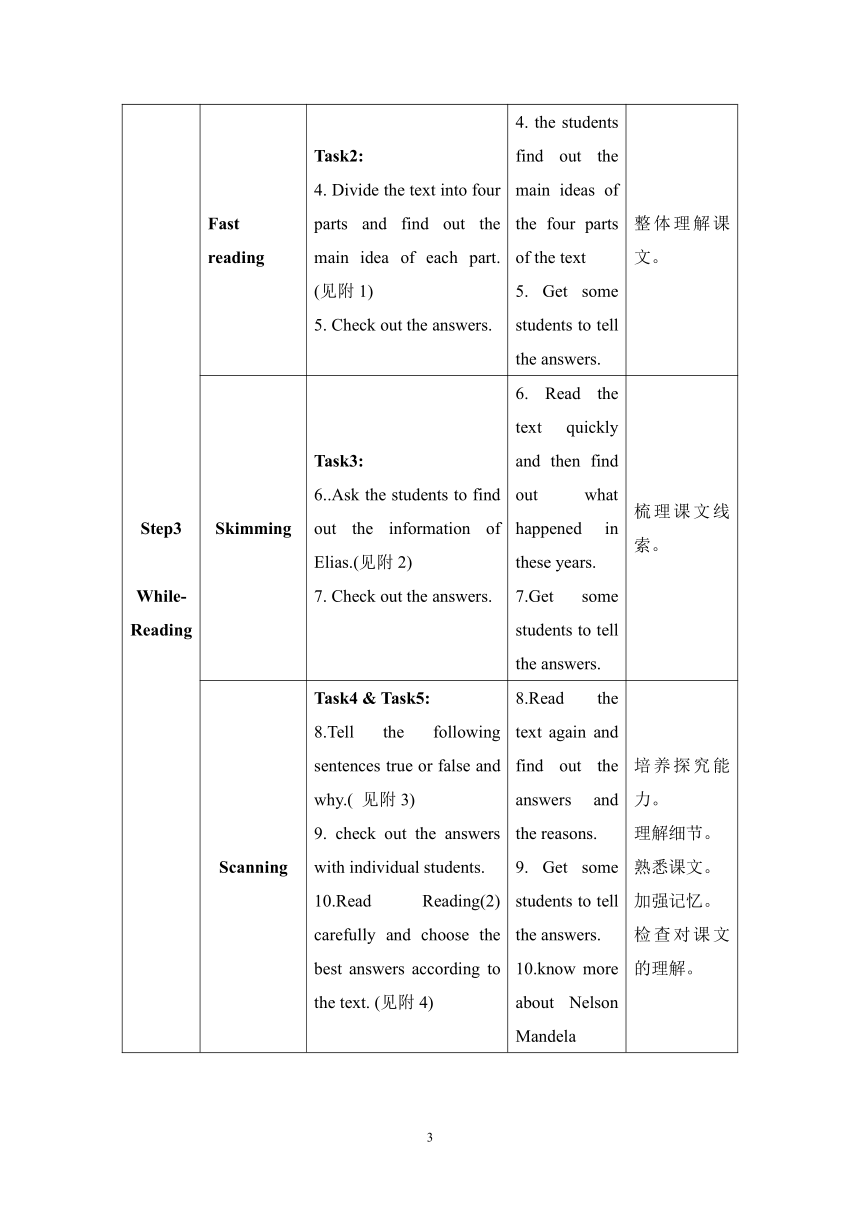模块1 Unit 5 Nelson Mandel-a modern hero阅读课教案
文档属性
| 名称 | 模块1 Unit 5 Nelson Mandel-a modern hero阅读课教案 |  | |
| 格式 | rar | ||
| 文件大小 | 14.4KB | ||
| 资源类型 | 教案 | ||
| 版本资源 | 人教版(新课程标准) | ||
| 科目 | 英语 | ||
| 更新时间 | 2008-10-10 07:36:00 | ||
图片预览



文档简介
人教版Unit 5 Nelson Mandela---a modern hero 阅读课教案
广东省增城市永和中学 李志琴
1. Teaching goals: In this lesson students will develop the knowledge and understanding Nelson Mandela as a great person.
(1). Target language: To enable students to master some English expressions and phrases.
a. words : hero, quality, republic, principle prison, prisoner, period, law, fee, gold, terror, youth, league, stage, vote, position, violence, blanket, guard, degree, fear, cruelty, reward, criminal, leader, president, fight, advise, continue,accept, sentence, willing, active, peaceful, equal, educated, anti-black,sincerely.
b. expressions: lose heart, in trouble, worry about, out of work, as a matter of fact, blow up, put …in prison, come to power, set up, be sentenced to, Youth League.
c.important structure
1). The school where I had studied only two years was three kilometers away.
2).This was a time when you had got to have a passbook to live in Johannesburg.
3). This is the government building in which the trial of Nelson Madala was held in 1963.
4). The person to whom you should be grateful for a peaceful South Africa is Nelson Madenla.
(2). Ability goals
Students are trained to improve their reading abilities.
(3). Learning ability goals
a. Students should learn to grasp the main idea by understanding some of the key words and phrases.
b. To get students to understand the quality of a great person.
(4).Motional goals
a. Motivate the studends’ interest in learning English.
b. Understand how to be a great person.
2. Teaching important point
Let students summarize the whole passage and identify new words and expressions which appear in the text.
3. Teaching difficult point
How to improve students’ reading comprehension.
4. Teaching aids
Tape-recorder, computer and some slides.
5. Teaching Methods: task-based, students-centered, equipment-aided.
6. Learning Methods: co-operation, exploration study.
7. Teaching materials: Reading (1) and reading (2) in unit 5
8. Teaching procedures and ways
The teacher’s activities Students’ activities Purpose
Step1Greeting 1. Greet the class 1. Free talk 引出课题
Step2Pre-reading Task1:2. Show some pictures of great persons 2. Guess out who is in the picture. 激发学生兴趣和好奇心,使学生自然而然地进入新地教学中。
3. Show the picture of Nelson Mandela, and ask the students to guess what kind of person he is. 3. Tell us more about Nelson Mandela. 激发学生兴趣和好奇心,使学生自然而然地进入新地教学中。
Step3While-Reading Fast reading Task2:4. Divide the text into four parts and find out the main idea of each part. (见附1)5. Check out the answers. 4. the students find out the main ideas of the four parts of the text5. Get some students to tell the answers. 整体理解课文。
Skimming Task3:6..Ask the students to find out the information of Elias.(见附2)7. Check out the answers. 6. Read the text quickly and then find out what happened in these years.7.Get some students to tell the answers. 梳理课文线索。
Scanning Task4 & Task5:8.Tell the following sentences true or false and why.( 见附3)9. check out the answers with individual students.10.Read Reading(2) carefully and choose the best answers according to the text. (见附4) 8.Read the text again and find out the answers and the reasons.9. Get some students to tell the answers.10.know more about Nelson Mandela 培养探究能力。理解细节。熟悉课文。加强记忆。检查对课文的理解。
Retell Task6:11. Show a timetable of the text.1940: 1946:1948: 1952:1963: out of prison: 11. Try to retell this text making use of the timetable. 巩固理解。
Explanation 12.Show some language points on the screen and explain them. (见附5) 12. Listen to the teacher and understand them. 解决课文难点。
Step4Post-reading 13. Writing Write a passage about Nelson Mandela according to the chart. 13. Write a passage about Nelson Mandela according to the chart and then read the text. 线条显示,简明易懂,有利于学生理解和掌握。
Step 5 Summary 14.Sum up the main idea of the text ,the languange points and how to write a passage about a person. 14. Do it with the teacher. 巩固知识。
Step 6 Homework Make a dialogue about heroesPreview the Attributive clause led by when/ where/why 培养运用能力。
附1:Divide the text into four parts and find out the main idea of each part.
Part 1: Paragraph 1-2 The life before meeting Nelson Mandela.
Part 2: Paragraph 3-5 The change after meeting Nelson Mandela.
Part 3: Paragraph 6 The life in prison
Part 4: Paragraph 7 The life out of prison
附2: Ask the students to find out the information of Elias.
(1) The life before meeting Nelson Mandela.
Birth date :
Birth place: South African
Study: only two years
Job: a gold miner
(2) The change after meeting Nelson Mandela when Mandela organized the ANC Youth League.
1963: helped to blow up some government buildings
(3) The life in prison
Study: study for his degree
(4) The life out of prison
Job: as a guide to his ol prison on Robben Island
附3: Tell the following sentences true or falseand why.
1. Elias met Nelson Mandela at school. ( )
2. Nelson Mandela was a black lawyer. ( )
3. Elias was unable to read or write because he was lazy. ( )
4. Nelson Mandela helped him keep his job. ( )
5. Elias was happy blowing up givernment buildings. ( )
6. nelson Mandela believed that black people were being treated as well as white people in South African. ( )
7. Nelson Mandela thought violence was a good way to help black people. ( )
8. The government were happy with Nelson Mandela and the ANC. ( )
Keys: 1. F 2.T 3. F 4. F 5. T 6. F 7. F 8. F
附4: Read Reading(2) carefully and choose the best answers according to the text.
1. Elias was unhappy in the prison because _________.
A. he was kept with criminals B. the prison guards studied with him
C. he had to study D. he could not study for a degree
2. Nelson mandela showed how good a leader he was because __________.
A. he fought the guards in prison B. he refused to let the guards study in his prison
C. he let the guards study in his school but not take the exams.
D.he let the guards study even though the prisoners could not take the exams.
3. Life for elias was not too bad in prison because _________.
A. he had to study B. he could study with the guards
C. he wanted to study D. he could study and get a degree
4. As leader of South Africa, Nelson Mandela helped prisoners of Robben Island by _________.
A. giving them an education B. giving them money
C. putting the guards in prison D. giving them a job
Keys: 1. A 2. A 3. D 4. A
附5: Show some language points on the screen and explain them.
1. advise v. to tell somebody what to do
(1). We advised an early start. (n.)
(2). I advised his starting at once. (v-ing)
(3). He often advised people to use their brains. (to do )
(4). I advised (him) that he (should) buy the book. ( that clause)
advise …on…
She advises the President on foreign affairs.
advice u
a piece of advice two pieces of advice
2. accept v. to take or receive ( something offered or given). Esp. willingly
The police aren’t allowed to accept rewords.
3.(1).continue vi. to go on over a long period of space , without stopping or being interrupted
The fighting continued for a week.
(2). Vt.
We’ll continue our game next Sunday. (n.)
After that he continued to devote himself to research work. ( to do)
Though wouded, he continued fighting as nothing had happened.(v-ing)
(3) link v.
He continued silent.(adj.)
4. Attributive clauses led by when/where
I shall never forget the day when we first visited the beautiful island.
The room where my grandfather once lived is not far from here.
5. only adv. nothing more than , with no one or nothing else added or included
I need only five minutes more.
Only如放在句首,且后接(1) 副词,(2) 介词短语 (3) 状语从句时,句子用倒装语序。
(1) Only then did he realize that he was wrong.
(2) Only in this way can you solve all the problems.
(3) Only when peace came in 1918 was Eistein able to get back to work.
only adj. With no others in the sme group or of the same type; the best
(1) John and I were the only people in the room.
(2) She is the only person for the job.
PAGE
1
广东省增城市永和中学 李志琴
1. Teaching goals: In this lesson students will develop the knowledge and understanding Nelson Mandela as a great person.
(1). Target language: To enable students to master some English expressions and phrases.
a. words : hero, quality, republic, principle prison, prisoner, period, law, fee, gold, terror, youth, league, stage, vote, position, violence, blanket, guard, degree, fear, cruelty, reward, criminal, leader, president, fight, advise, continue,accept, sentence, willing, active, peaceful, equal, educated, anti-black,sincerely.
b. expressions: lose heart, in trouble, worry about, out of work, as a matter of fact, blow up, put …in prison, come to power, set up, be sentenced to, Youth League.
c.important structure
1). The school where I had studied only two years was three kilometers away.
2).This was a time when you had got to have a passbook to live in Johannesburg.
3). This is the government building in which the trial of Nelson Madala was held in 1963.
4). The person to whom you should be grateful for a peaceful South Africa is Nelson Madenla.
(2). Ability goals
Students are trained to improve their reading abilities.
(3). Learning ability goals
a. Students should learn to grasp the main idea by understanding some of the key words and phrases.
b. To get students to understand the quality of a great person.
(4).Motional goals
a. Motivate the studends’ interest in learning English.
b. Understand how to be a great person.
2. Teaching important point
Let students summarize the whole passage and identify new words and expressions which appear in the text.
3. Teaching difficult point
How to improve students’ reading comprehension.
4. Teaching aids
Tape-recorder, computer and some slides.
5. Teaching Methods: task-based, students-centered, equipment-aided.
6. Learning Methods: co-operation, exploration study.
7. Teaching materials: Reading (1) and reading (2) in unit 5
8. Teaching procedures and ways
The teacher’s activities Students’ activities Purpose
Step1Greeting 1. Greet the class 1. Free talk 引出课题
Step2Pre-reading Task1:2. Show some pictures of great persons 2. Guess out who is in the picture. 激发学生兴趣和好奇心,使学生自然而然地进入新地教学中。
3. Show the picture of Nelson Mandela, and ask the students to guess what kind of person he is. 3. Tell us more about Nelson Mandela. 激发学生兴趣和好奇心,使学生自然而然地进入新地教学中。
Step3While-Reading Fast reading Task2:4. Divide the text into four parts and find out the main idea of each part. (见附1)5. Check out the answers. 4. the students find out the main ideas of the four parts of the text5. Get some students to tell the answers. 整体理解课文。
Skimming Task3:6..Ask the students to find out the information of Elias.(见附2)7. Check out the answers. 6. Read the text quickly and then find out what happened in these years.7.Get some students to tell the answers. 梳理课文线索。
Scanning Task4 & Task5:8.Tell the following sentences true or false and why.( 见附3)9. check out the answers with individual students.10.Read Reading(2) carefully and choose the best answers according to the text. (见附4) 8.Read the text again and find out the answers and the reasons.9. Get some students to tell the answers.10.know more about Nelson Mandela 培养探究能力。理解细节。熟悉课文。加强记忆。检查对课文的理解。
Retell Task6:11. Show a timetable of the text.1940: 1946:1948: 1952:1963: out of prison: 11. Try to retell this text making use of the timetable. 巩固理解。
Explanation 12.Show some language points on the screen and explain them. (见附5) 12. Listen to the teacher and understand them. 解决课文难点。
Step4Post-reading 13. Writing Write a passage about Nelson Mandela according to the chart. 13. Write a passage about Nelson Mandela according to the chart and then read the text. 线条显示,简明易懂,有利于学生理解和掌握。
Step 5 Summary 14.Sum up the main idea of the text ,the languange points and how to write a passage about a person. 14. Do it with the teacher. 巩固知识。
Step 6 Homework Make a dialogue about heroesPreview the Attributive clause led by when/ where/why 培养运用能力。
附1:Divide the text into four parts and find out the main idea of each part.
Part 1: Paragraph 1-2 The life before meeting Nelson Mandela.
Part 2: Paragraph 3-5 The change after meeting Nelson Mandela.
Part 3: Paragraph 6 The life in prison
Part 4: Paragraph 7 The life out of prison
附2: Ask the students to find out the information of Elias.
(1) The life before meeting Nelson Mandela.
Birth date :
Birth place: South African
Study: only two years
Job: a gold miner
(2) The change after meeting Nelson Mandela when Mandela organized the ANC Youth League.
1963: helped to blow up some government buildings
(3) The life in prison
Study: study for his degree
(4) The life out of prison
Job: as a guide to his ol prison on Robben Island
附3: Tell the following sentences true or falseand why.
1. Elias met Nelson Mandela at school. ( )
2. Nelson Mandela was a black lawyer. ( )
3. Elias was unable to read or write because he was lazy. ( )
4. Nelson Mandela helped him keep his job. ( )
5. Elias was happy blowing up givernment buildings. ( )
6. nelson Mandela believed that black people were being treated as well as white people in South African. ( )
7. Nelson Mandela thought violence was a good way to help black people. ( )
8. The government were happy with Nelson Mandela and the ANC. ( )
Keys: 1. F 2.T 3. F 4. F 5. T 6. F 7. F 8. F
附4: Read Reading(2) carefully and choose the best answers according to the text.
1. Elias was unhappy in the prison because _________.
A. he was kept with criminals B. the prison guards studied with him
C. he had to study D. he could not study for a degree
2. Nelson mandela showed how good a leader he was because __________.
A. he fought the guards in prison B. he refused to let the guards study in his prison
C. he let the guards study in his school but not take the exams.
D.he let the guards study even though the prisoners could not take the exams.
3. Life for elias was not too bad in prison because _________.
A. he had to study B. he could study with the guards
C. he wanted to study D. he could study and get a degree
4. As leader of South Africa, Nelson Mandela helped prisoners of Robben Island by _________.
A. giving them an education B. giving them money
C. putting the guards in prison D. giving them a job
Keys: 1. A 2. A 3. D 4. A
附5: Show some language points on the screen and explain them.
1. advise v. to tell somebody what to do
(1). We advised an early start. (n.)
(2). I advised his starting at once. (v-ing)
(3). He often advised people to use their brains. (to do )
(4). I advised (him) that he (should) buy the book. ( that clause)
advise …on…
She advises the President on foreign affairs.
advice u
a piece of advice two pieces of advice
2. accept v. to take or receive ( something offered or given). Esp. willingly
The police aren’t allowed to accept rewords.
3.(1).continue vi. to go on over a long period of space , without stopping or being interrupted
The fighting continued for a week.
(2). Vt.
We’ll continue our game next Sunday. (n.)
After that he continued to devote himself to research work. ( to do)
Though wouded, he continued fighting as nothing had happened.(v-ing)
(3) link v.
He continued silent.(adj.)
4. Attributive clauses led by when/where
I shall never forget the day when we first visited the beautiful island.
The room where my grandfather once lived is not far from here.
5. only adv. nothing more than , with no one or nothing else added or included
I need only five minutes more.
Only如放在句首,且后接(1) 副词,(2) 介词短语 (3) 状语从句时,句子用倒装语序。
(1) Only then did he realize that he was wrong.
(2) Only in this way can you solve all the problems.
(3) Only when peace came in 1918 was Eistein able to get back to work.
only adj. With no others in the sme group or of the same type; the best
(1) John and I were the only people in the room.
(2) She is the only person for the job.
PAGE
1
